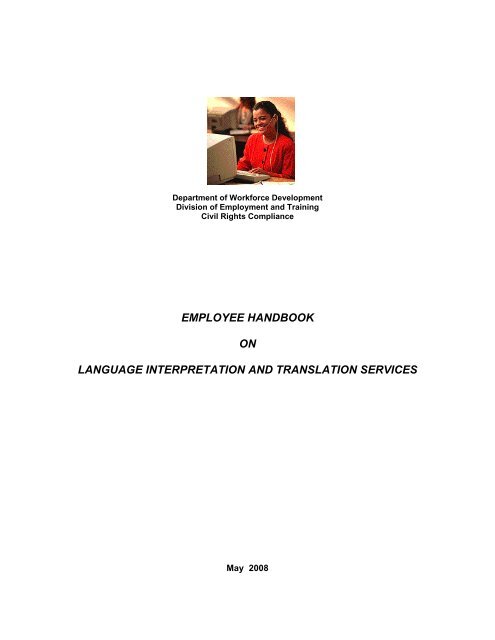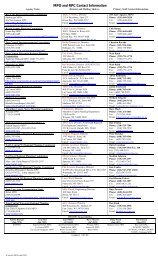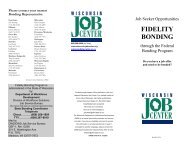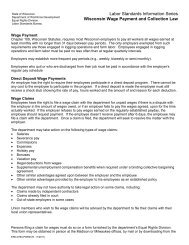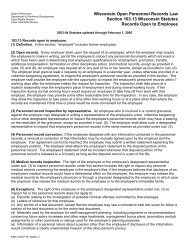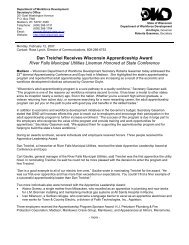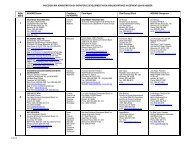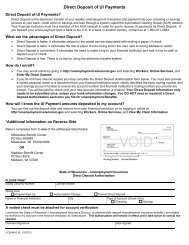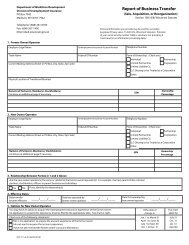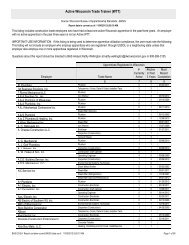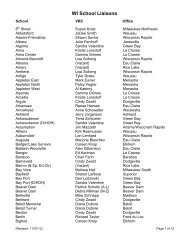Language Interpretation and Translation Services Handbook
Language Interpretation and Translation Services Handbook
Language Interpretation and Translation Services Handbook
You also want an ePaper? Increase the reach of your titles
YUMPU automatically turns print PDFs into web optimized ePapers that Google loves.
Department of Workforce Development<br />
Division of Employment <strong>and</strong> Training<br />
Civil Rights Compliance<br />
EMPLOYEE HANDBOOK<br />
ON<br />
LANGUAGE INTERPRETATION AND TRANSLATION SERVICES<br />
May 2008
Division of Employment <strong>and</strong> Training<br />
Civil Rights Compliance<br />
Employee H<strong>and</strong>book on <strong>Language</strong> <strong>Interpretation</strong> <strong>and</strong> <strong>Translation</strong> <strong>Services</strong><br />
Introduction <strong>and</strong> Purpose:<br />
Introduction<br />
DET is committed to providing equal opportunity in all DET programs <strong>and</strong> services to enable full<br />
compliance with Civil Rights laws. When customers who are hearing impaired or who possess<br />
Limited English Proficiency (LEP) call or walk-in, DET staff need to be able to provide timely<br />
assistance to them in making the connection with the appropriate service, benefit or program<br />
which we, or our federal financial assistance grantees <strong>and</strong> partners provide.<br />
This H<strong>and</strong>book provides the requirements <strong>and</strong> “how to” directions for DET staff who may need<br />
to acquire interpretation or translation services for customers<br />
While this H<strong>and</strong>book is for DET staff, it’s important to note that DET’s program grantees <strong>and</strong><br />
contractors are subject to full compliance with civil rights laws <strong>and</strong> are responsible for similar full<br />
compliance of their sub-grantees <strong>and</strong> sub-contractors.<br />
Division Staff Contacts:<br />
Equal Opportunity <strong>and</strong> Complaint Officer for DET Programs<br />
• Bill Franks<br />
Oversees Civil Rights Compliance (CRC) by DET Grant Recipient Agencies,<br />
including, Equal Opportunity (EO), Affirmative Action (AA) <strong>and</strong> Limited English<br />
Proficiency (LEP) Compliance.<br />
Telephone: 608- 266-6889 or TTY 866- 864- 4585.<br />
Affirmative Action Officer, LEP Coordinator <strong>and</strong> Complaint Officer for DET Staff<br />
• Carolyn Gormican<br />
Oversees DET compliance of EO, AA <strong>and</strong> LEP requirements.<br />
Telephone: 608- 267-2474.<br />
Written <strong>Translation</strong> of Vital Documents<br />
Vital documents are those DET documents, paper or electronic, which contain critical<br />
information to customers about accessing, adjusting or eliminating DET services or benefits<br />
or is a DWET document required by law. Vital Documents must be translated for LEP<br />
persons. Under the “Safe Harbor” guidance all recipients of federal <strong>and</strong>/or state funds are<br />
required to provide written translations, free of cost to the customer for all documents<br />
identified as Vital. Specific requirements include the following:<br />
• Written translations of Vital Documents must be provided for each eligible language<br />
group that constitutes at least 5% or 1,000 LEP individuals, whichever is less, of the<br />
population of persons served or likely to be served by programs in the service area.<br />
• All of DET’s Vital Documents must be translated into Spanish <strong>and</strong> Hmong at a minimum<br />
because these groups meet the threshold for translation in Wisconsin. Other languages<br />
that meet this threshold will depend on the service.<br />
1
• DET is responsible for the costs related to translation of Vital Documents that are issued<br />
by the Division.<br />
• Customers with LEP will receive timely access to translated written materials at no cost<br />
to them.<br />
• When a Vital Document is developed, DET requires that translation will occur within 30<br />
calendar days of issuance of the English version.<br />
• The following link is a starting place for obtaining data on LEP persons<br />
http://www.doa.state.wi.us/dir/wisconsin/index.html. Data are from the United States<br />
Census Bureau Profiles. The best source of “official” Census data used to determine<br />
thresholds is the Demographic Profiles (DP) # 2 specifically, the “<strong>Language</strong> Spoken at<br />
Home – <strong>Language</strong> other than English, Speak English Less than “Very Well” data set.<br />
Contact Bill Franks for assistance on further demographic information on LEP Persons.<br />
• Vital Documents Require <strong>Translation</strong>:<br />
Vital Documents are those DET documents, paper or electronic, which contain critical<br />
information to customers about accessing, adjusting or eliminating DET services or benefits<br />
or is a DET document required by law. Contracted Written <strong>Translation</strong> <strong>Services</strong>: DWD<br />
obtains written translation of documents through various vendors under contract with the<br />
Department of Health <strong>and</strong> Family <strong>Services</strong>. Below is the web link for vendors currently<br />
under contract.<br />
http://vendornet.state.wi.us/vendornet/asp/ContractDetail.asp?SystemContractNumber=19<br />
22&sComm<strong>and</strong>=DisplayContract<br />
If the answer to any of the following is yes, the document must be translated:<br />
<br />
<br />
<br />
<br />
<br />
<br />
<br />
The form/document must be completed <strong>and</strong> signed by a customer.<br />
The publication contains information the customer is required to know.<br />
The publication contains the customer’s rights <strong>and</strong> responsibilities when receiving<br />
services or benefits.<br />
The form/publication/document contains rules, regulations, or laws that must be<br />
followed by the customer in order to receive services or benefits.<br />
The document informs the customer of eligibility, any change in services or benefits,<br />
or of something that is happening with their case/program participation.<br />
The document requires a response from the customer.<br />
The document contains medical discharge information.<br />
• Non-Vital Documents Requiring <strong>Translation</strong>s:<br />
Non-Vital documents may be translated at the discretion of the program operator/sub<br />
grantee.<br />
• Requesting Written <strong>Translation</strong> of Documents:<br />
Staff will need to process the translation of Vital Documents through their Bureau’s Forms<br />
Coordinator. Forms Coordinators <strong>and</strong> the “content expert” share responsibility for<br />
developing <strong>and</strong> disseminating the document.<br />
2
The Forms Coordinators need to advise DET’s LEP Coordinator, Carolyn Gormican, of any<br />
new Vital Documents being created. She maintains an inventory of DET’s Vital Documents<br />
in accordance with DET’s LEP Policy.<br />
DET’s Form Coordinators:<br />
• Julie Trimble, DET Division Forms Coordinator, 608-261-4418, Bureau of Program<br />
Management <strong>and</strong> IT Coordination (BPM&ITC). Back-Up: S<strong>and</strong>y Fike at (608) 266-7854<br />
• Mary Larson, Bureau of Apprenticeship Forms Coordinator, 608- 266-3332, Bureau of<br />
Apprenticeship St<strong>and</strong>ards (BAS)<br />
• Kristy Budde, Bureau of Workforce Training Forms Coordinator, 608- 266-9199, Bureau<br />
of Workforce Training (BWT)<br />
3
Oral <strong>Interpretation</strong><br />
• Requesting Oral <strong>Interpretation</strong> for Customers:<br />
Customers with LEP will receive timely oral interpretation at no cost to them. If there are<br />
fewer than 50 persons in a language group of the population group served or likely to be<br />
served, DET is not required to translate a document in writing, but is required to provide<br />
written notice, in the primary language of the LET group/customer of their right to oral<br />
interpretation of those written materials, free of cost to them.<br />
• Telephone Calls: When an LEP customer calls, DET staff will request language assistance<br />
(interpreter services) from Certified <strong>Language</strong> International (CLI) immediately. DET<br />
contracted with CLI for oral interpretation/translation services.<br />
• How to Contact CLI for <strong>Interpretation</strong>s:<br />
1. Dial 1-800-225-5254 or 1-800-Call LCI.<br />
*Operator will answer, "Certified <strong>Language</strong>s International, this is ….."<br />
2. Tell the operator that you need an interpreter over the phone or in person.<br />
3. The Operator will ask for your organization. Tell them your Department <strong>and</strong><br />
Division (DWD/DET).<br />
4. They will then ask you for the language you need, your name <strong>and</strong> phone number.<br />
o<br />
If you need an interpreter in person, you will need to schedule <strong>and</strong><br />
appointment, for a specific date <strong>and</strong> time.<br />
5. You will be asked for additional information (i. e. the CLI contact person for the<br />
DET, section, the address for your agency, etc).<br />
6. When calling for a phone interpretation, you will be placed on hold while CLI<br />
connects you with the interpreter. Once the interpreter is on the line, the<br />
operator will drop out of the call leaving the interpreter on the line with you.<br />
If you need to call a third party, please indicate that to the operator before the<br />
interpreter is on the line so the operator can gather the information needed for a 3-<br />
way phone call.<br />
CLI recommends that you use speaker phones or an extension h<strong>and</strong>set for phone<br />
interpretation.<br />
If there are issues with CLI, other qualified interpreters <strong>and</strong> translators may be<br />
utilized from an approved list. If you have any questions regarding CLI, please<br />
contact the DET Civil Rights Unit at (608) 266-5335.<br />
• Walk-Ins: When an LEP customer walks-in, DET staff should ask the customer to point to<br />
the language that he/she speaks, using either the "I Speak Card" available at<br />
http://dhfs.wisconsin.gov/civilrights/ISPEAKCARDS.pdf or "<strong>Language</strong> Interpreter<br />
Identification Card, provided by CLI, 1-800-362-2341. Office Associates <strong>and</strong> main<br />
reception areas of DET offices should have a supply of the “I Speak Card.”<br />
• Restrictions on Allowing Family/Friends as Oral Interpreters: DET requires that minor<br />
children cannot be used as interpreters. Adult family or friends of the customer may serve<br />
as interpreters only after the following:<br />
• DET informs the LEP customer of the right to free interpreter services;<br />
4
• The Customer declines such services in writing <strong>and</strong> requests the use of a family member<br />
or friend; <strong>and</strong><br />
• DET determines the use of such a person would not compromise the effectiveness of<br />
services or violate the confidentiality of the LEP customer.<br />
Assisting Hearing Impaired Customers<br />
• Making/Receiving TTY/TDD Calls: Effective communication with deaf, deafblind <strong>and</strong> hard<br />
of hearing persons can often be provided through auxiliary aids <strong>and</strong> services. It is strongly<br />
recommended to make it a practice to consult with the individual about how he/she best<br />
communicates <strong>and</strong> what accommodations(s) work best for that individual <strong>and</strong> in what<br />
situations. The following are current methods utilized;<br />
• Telephone Text (TTY) or Telecommunication Device (TDD): A device such as TTY,<br />
sometimes called TDD, for the Deaf, is a special device that lets people who are deaf,<br />
hard of hearing, or speech-impaired use the telephone to communicate, by allowing<br />
them to type messages back <strong>and</strong> forth to one another instead of talking <strong>and</strong> listening. A<br />
TTY is required at both ends of the conversation in order to communicate.<br />
To use a TTY, you set a telephone h<strong>and</strong>set onto special acoustic cups built into the TTY<br />
(some TTY models can be plugged directly into a telephone line). Then, type the<br />
message you want to send on the TTY's keyboard. As you type, the message is sent<br />
over the phone line, just like your voice would be sent over the phone line if you talked.<br />
You can read the other person's response on the TTY's text display.<br />
• Telecommunications Relay Service (TRS): If you don't have a TTY, you can still call a<br />
person who is deaf, hard of hearing, or speech-impaired by using the TRS. With TRS, a<br />
special operator types whatever you say so that the person you are calling can read your<br />
words on his or her TTY display. He or she will type back a response, which the TRS<br />
operator will read aloud for you to hear over the phone. Toll free TRS services are<br />
available 24 hours a day, 365 days a year. Numerous DWD Employees have software<br />
for TTY communication called Nextalk. Nextalk operates through a computer client<br />
interface <strong>and</strong> allows users to communicate with each other by typing messages using<br />
dialogue boxes <strong>and</strong> relatively simple comm<strong>and</strong>s to facilitate the back <strong>and</strong> forth exchange<br />
of communication in real time.<br />
• DET TTY/TDD Stations: In DET Central Office Bill Franks has TTY.<br />
o The number for Bill Franks is (866) 864-4585.<br />
o<br />
In the Job Centers, DET staff need to be aware of who operates the TTY <strong>and</strong> the<br />
number.<br />
• Providing Signing <strong>Services</strong> for Hearing Impaired Customers:<br />
The Americans with Disabilities Act (ADA) is a federal civil rights law passed in 1990 created<br />
to protect people with disabilities from discrimination in employment (Title I), in programs <strong>and</strong><br />
activities offered by state <strong>and</strong> local governments (Title II), <strong>and</strong> in accessing goods <strong>and</strong><br />
services offered in places of public accommodation, i.e. stores, hotels, restaurants, medical<br />
facilities, etc. (Title III). Employers having 15 or more employees, employment agencies,<br />
labor organizations, <strong>and</strong> joint labor-management committees must comply with Title I of the<br />
ADA.<br />
5
The Wisconsin Fair Employment Law (WFEL) is contained in Section 111.31 of the<br />
Wisconsin Statutes. The purpose of WFEL is to protect the rights of people to employment<br />
free of unlawful discrimination. People with disabilities, including those who may be deaf or<br />
hard of hearing, are protected. All Wisconsin employers, public <strong>and</strong> private, employment<br />
agencies, licensing agencies, <strong>and</strong> unions are covered regardless of the number of<br />
employees.<br />
Some customers, employees or partner agency staff may require a Sign language<br />
Interpreter. For those customers, you may need to provide notice that your office has or<br />
does not have a Sign <strong>Language</strong> Interpreter immediately available. Such Interpreters are<br />
in high dem<strong>and</strong> <strong>and</strong> must usually be made available with some prior notice to whoever is<br />
providing the service in question.<br />
The best resource we have been able to locate for requesting a Sign <strong>Language</strong><br />
Interpreter is to contact the Department of Health <strong>and</strong> Family <strong>Services</strong>, Division of Long<br />
Term Care, Office for the Deaf <strong>and</strong> Hard of Hearing. There are five (5) Regional<br />
Offices throughout the State.<br />
Southern Regional Office<br />
1 West Wilson Street, Room 451<br />
Madison, WI 53707<br />
(888) 241-9428 TTY<br />
(608) 444-0335<br />
MentzBJ@dhfs.state.wi.us<br />
Southeastern Regional Office<br />
141 NW Barstow Street, Room 104<br />
Waukesha, WI 54313<br />
(888) 701-1246 TTY<br />
(262) 521-5128<br />
AltmaJR@dhfs.state.wi.us<br />
Northeastern Regional Office<br />
Options Independent Living Center<br />
555 Country Club Road<br />
Green Bay, WI 54313-4908<br />
(888) 241-8430 TTY<br />
(920) 490-0700<br />
(888) 465-1515<br />
(920) 490-0500 VP<br />
LiberMA@dhfs.state.wi.us<br />
Western Regional Office<br />
610 Gibson Street, Suite 1<br />
Eau Claire, WI 54701<br />
(715) 836-2107<br />
(888) 701-1254 TTY<br />
SmallCM@dhfs.state.wi.us<br />
Northern Regional Office<br />
1000 Lakeview Drive<br />
Wausau, WI 544401<br />
(888) 241-94331 TTY<br />
(715) 842-7693<br />
(715) 842-7639 VP<br />
ConnoMA@dhfs.state.wi.us<br />
Alternative Format, please contact:<br />
ODHH Central Office<br />
1 W. Wilson Street, Room 451<br />
Madison, WI 53707-7851<br />
(608) 266-3118 or<br />
(866) 710-1255 TTY<br />
wisconsin.gov/sensory<br />
Complaints<br />
Job Center Complaint Coordinator System:<br />
Wisconsin has a network of Job Centers throughout the State. On 02/13/2008, DET issued<br />
Admin Memo 08-01, Job Center Complaint Coordinator System available at<br />
http://dwd.wisconsin.gov/det/adminmemos/08001.htm which updated information on<br />
Wisconsin’s Job Center Complaint Coordinator System, including a current list of Complaint<br />
Coordinators (CC). This list will be continually updated as information is made available to DET.<br />
The CC serves as a centralized point for anyone visiting or working at the Job Center to go to<br />
6
with any kind of complaint. Complaints could range from serious harassment to potholes in the<br />
parking lot. The CC will listen to the complaint <strong>and</strong> refer the complaint to the proper<br />
resource/partner agency for resolving the complaint. The CC’s will not be expected to do<br />
anything beyond referral; they will not be the person who resolves the complaint. Many<br />
complaints need to follow existing formal complaint/appeal procedures. The CC is the conduit<br />
to make sure the complainant gets to the resource/agency to resolve the complaint based on<br />
the type of complaint or the particular program involved.<br />
Training<br />
Training <strong>and</strong> Technical Assistance:<br />
All staff need to be aware of the information provided in this h<strong>and</strong>book in order to assist with<br />
customer needs. Training may be provided in a number of different formats (in person, via<br />
written information, via conference calls, <strong>and</strong>/or via computer) to minimize cost <strong>and</strong> to provide<br />
flexible scheduling for Division staff. Staff are encouraged to attend other related training on a<br />
regular basis as approved by their supervisor.<br />
All Grant recipient <strong>and</strong> sub-recipient agencies of DET are required to have their staff participate<br />
in a yearly training related to civil rights compliance, including EO, AA, LEP, services to persons<br />
with disabilities, access to services <strong>and</strong> other programs to enhance sensitivity.<br />
See the DET civil rights website for materials, brochures <strong>and</strong> other information for purposes of<br />
training <strong>and</strong> technical assistance at<br />
http://dwd.wisconsin.gov/det/civil_rights/default.htm<br />
7


